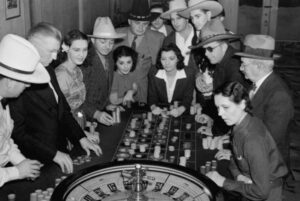History of Casinos: From Las Vegas to the Digital Age
Blackjack, Video Poker, Roulette, Slot Machines and more


The story of casinos is one of glamour, innovation, and transformation a journey that has taken gambling from smoky backrooms to the neon lights of Las Vegas and now into the digital realm. This evolution reflects not just changing technologies, but shifting cultural attitudes toward gambling entertainment.
SEO Admin


Related Posts
The Birth of Sin City: Las Vegas Rises from the Desert
 Las Vegas wasn’t always the entertainment capital we know today. In the early 1900s, it was little more than a dusty railroad stop. Everything changed in 1931 when Nevada legalized gambling during the Great Depression as a desperate economic measure. The construction of the Hoover Dam brought thousands of workers to the area, creating a ready market for gambling establishments.
Las Vegas wasn’t always the entertainment capital we know today. In the early 1900s, it was little more than a dusty railroad stop. Everything changed in 1931 when Nevada legalized gambling during the Great Depression as a desperate economic measure. The construction of the Hoover Dam brought thousands of workers to the area, creating a ready market for gambling establishments.
The first casino-resort on what would become the famous Strip was El Rancho Vegas, opening in 1941. But it was gangster Bugsy Siegel’s Flamingo Hotel, launched in 1946, that established the blueprint for the luxury casino-resort. Though Siegel didn’t live to see it (he was murdered in 1947), his vision of a gambling paradise in the desert took root and flourished.
The Golden Age: Mid-Century Casino Culture
The 1950s and 60s marked the golden era of Las Vegas casinos. The Sands, the Dunes, and the Stardust became iconic establishments where the Rat Pack performed and celebrities mingled with high-rollers.
Casino culture permeated American consciousness through films and music, solidifying Las Vegas as not just a gambling destination but a cultural phenomenon.
During this period, casinos refined their business model offering luxurious accommodations, headline entertainment, and fine dining at subsidized prices to attract gamblers. The concept of the “comp” was perfected: free rooms, meals, and shows for those who spent enough at the tables.
Beyond the Strip: Global Expansion
While Las Vegas was establishing itself as America’s gambling mecca, Monte Carlo maintained its position as Europe’s elegant gambling destination. The Casino de Monte-Carlo, opened in 1863, represented old-world glamour that contrasted with Las Vegas’s flashier approach.
The 1970s and 80s saw casino gambling expand beyond these traditional centers. Atlantic City legalized casinos in 1978, attempting to revitalize the fading resort town. Native American tribes began operating casinos on reservation lands following legal victories culminating in the Indian Gaming Regulatory Act of 1988. By the 1990s, riverboat and tribal casinos had brought gambling closer to most Americans.
The Mega-Resort Era: Raising the Stakes
The 1989 opening of The Mirage in Las Vegas, developed by Steve Wynn, ushered in the era of the mega-resort. With its erupting volcano, dolphin habitat, and lavish accommodations, The Mirage demonstrated that casinos could be family-friendly destinations with attractions beyond gambling.
This concept reached its peak with themed resorts like the pyramid-shaped Luxor, the medieval Excalibur, and the Venetian with its indoor canals. Las Vegas reinvented itself again, focusing on spectacle and experience while expanding its appeal to non-gamblers.
The Digital Revolution: Casinos in Your Pocket
The most dramatic transformation in casino history began in the mid-1990s with the advent of online gambling. The first online casinos offered basic versions of traditional games, but quickly evolved as technology improved.
By the early 2000s, players could enjoy live dealer games streamed from studio casinos.
Mobile technology has accelerated this digital revolution. Today’s players can access thousands of casino games from their smartphones, making gambling more accessible than ever before. Virtual reality casinos now offer immersive experiences that replicate the atmosphere of physical establishments without requiring travel.
The Future of Casinos: Blending Physical and Digital
The modern casino landscape is increasingly hybrid. Physical casinos incorporate digital elements through electronic table games and mobile betting within their properties. Online platforms offer the convenience of digital play while striving to capture the social aspects that make traditional casinos appealing.
This convergence suggests a future where the boundaries between physical and digital gambling continue to blur, with each enhancing the other rather than competing directly.
Ready to be part of this ongoing story?
With a heritage rooted in traditional gaming excellence and an eye toward the future of digital entertainment, Betco.ag offers the perfect blend of classic casino thrills and modern convenience. Sign up now and receive a welcome bonus that would impress even the high-rollers of Vegas’s golden age!
